Silberman Family
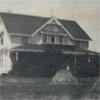 The family of Martin and Lisa Silberman provides another worthwhile glimpse into the life of Alberta's early pioneers. Lisa was the daughter of Jakob and Mari Erdman, Barons' foremost settlers. Born in Crimea, Mari settled in Alberta in 1904 at the age of 23. Martin Silberman was born in 1877 on the Ottasaare farm in Poltsamaa district north of Tartu, Estonia. He grew up and farmed there for 27 years. Alone, he immigrated to Alberta in 1905. Two years later, he married Lisa Erdman. They had met at an Estonian youth conference organized by Reverend John Sillak of Medecine Hat, Alberta. Historical accounts report that the wedding festivities continued for three days.
The family of Martin and Lisa Silberman provides another worthwhile glimpse into the life of Alberta's early pioneers. Lisa was the daughter of Jakob and Mari Erdman, Barons' foremost settlers. Born in Crimea, Mari settled in Alberta in 1904 at the age of 23. Martin Silberman was born in 1877 on the Ottasaare farm in Poltsamaa district north of Tartu, Estonia. He grew up and farmed there for 27 years. Alone, he immigrated to Alberta in 1905. Two years later, he married Lisa Erdman. They had met at an Estonian youth conference organized by Reverend John Sillak of Medecine Hat, Alberta. Historical accounts report that the wedding festivities continued for three days.
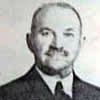 Martin and Lisa's first home was a sod hut three miles south of Barons. Their daughter, Helmi, was born on the farm in 1908. Martin and Lisa also had twins named Ernest and Walter. They arrived the following year. Obtaining clean drinking water was a considerable challenge. Drinkable water was soon hauled by wagons from nearby Keho Lake, one mile from the farm.
Martin and Lisa's first home was a sod hut three miles south of Barons. Their daughter, Helmi, was born on the farm in 1908. Martin and Lisa also had twins named Ernest and Walter. They arrived the following year. Obtaining clean drinking water was a considerable challenge. Drinkable water was soon hauled by wagons from nearby Keho Lake, one mile from the farm.
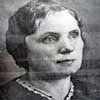 The coal stove and furnace in the basement required coal transported from the mines in Lethbridge. Coal oil lamps provided light during the long winter evenings. The terrain on which Barons was located was very flat with very few trees and no river closer than ten miles. Prairie fires were thus common.
The coal stove and furnace in the basement required coal transported from the mines in Lethbridge. Coal oil lamps provided light during the long winter evenings. The terrain on which Barons was located was very flat with very few trees and no river closer than ten miles. Prairie fires were thus common.
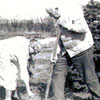 In 1910 a larger, wood-frame house was built. A conglomeration of deciduous and coniferous trees were planted as a means of providing shelter from southern Alberta's blustery winds. For nine years, the Silberman's successfully farmed their land. When Estonia claimed independence in 1918, Martin Silberman wanted to return to his birthplace and provide his children with a sound Estonian education. When payments could not be made, the Silberman's returned to Canada, reclaiming their farm in Barons.
In 1910 a larger, wood-frame house was built. A conglomeration of deciduous and coniferous trees were planted as a means of providing shelter from southern Alberta's blustery winds. For nine years, the Silberman's successfully farmed their land. When Estonia claimed independence in 1918, Martin Silberman wanted to return to his birthplace and provide his children with a sound Estonian education. When payments could not be made, the Silberman's returned to Canada, reclaiming their farm in Barons.
Walter Silberman and his wife Lea farmed in Barons until they moved west, settling in Victoria, British Columbia. Walter's twin Ernest practiced law in Vancouver and served as a clerk in the famous Nuremburg Trials that tried war criminals from World War II. During his later years, he moved to southern California.
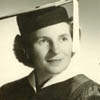 Helmi (Silberman) Munz completed a Bachelor of Arts in Seattle, Washington and a Master of Arts from Columbia University in New York City. She later resided in Calgary and Edmonton.
Helmi (Silberman) Munz completed a Bachelor of Arts in Seattle, Washington and a Master of Arts from Columbia University in New York City. She later resided in Calgary and Edmonton.
Living in Canada after World War II, Martin Silberman was committed to develop and promote his new Canadian heritage. He spoke only English and said very little with regards to his Estonian heritage. Martin and Lisa lived a quiet life in Barons. Martin died in Lethbridge in 1956. Lisa died in Calgary at the age of 93. As of 2006, Martin and Lisa had eight grandchildren, 16 great-grandchildren, and 10 great-great grandchildren.








